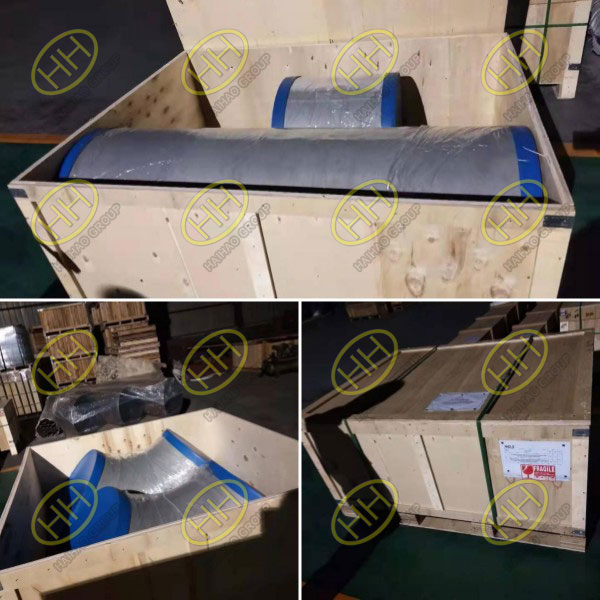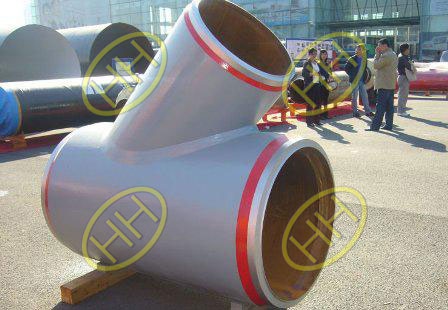The role of Titanium (Ti) in enhancing steel properties
Titanium (Ti) plays a critical role in improving the properties of steel, primarily through the formation of stable compounds such as titanium carbide (TiC) and titanium nitride (TiN). These compounds contribute to grain refinement, which enhances the strength, hardness, and toughness of steel. Moreover, titanium significantly boosts the corrosion resistance of steel, especially in stainless steels, where it effectively prevents intergranular corrosion. Additionally, titanium reduces the harmful effects of elements like sulfur and phosphorus, thereby improving the weldability and workability of steel. As a result, titanium is widely used as a grain refinement and stabilizing element in high-strength low-alloy steels, stainless steels, and tool steels.

Alloy 800 elbows and pipes
Effects on Steel’s Microstructure and Heat Treatment
1.Affinity with Nitrogen, Oxygen, and Carbon:
Titanium has a strong affinity for nitrogen (N), oxygen (O), and carbon (C), making it an excellent deoxidizer, degassing agent, and an effective element for fixing nitrogen and carbon in steel. The compound formed between titanium and carbon is highly stable, requiring temperatures above 1000°C to slowly dissolve into the iron (Fe) solid solution. TiC particles inhibit the growth of steel grains, raising the temperature at which grain coarsening occurs to above 1000°C.
2.Austenite Phase Reduction and Hardenability:
Titanium is one of the strong ferrite-forming elements, which narrows the austenite phase region and significantly increases the critical temperatures A1 and A3. When titanium is in solid solution form, it enhances the hardenability of steel, while the presence of TiC particles can decrease hardenability.
3.Precipitation Hardening:
At certain titanium concentrations, the dispersed precipitation of titanium compounds, such as TiC, can lead to precipitation hardening. This process improves the strength and durability of the steel.
Effects on Mechanical Properties
1.Strengthening Effects:
When titanium is in solid solution within the ferrite phase, its strengthening effect surpasses that of aluminum (Al), manganese (Mn), nickel (Ni), and molybdenum (Mo), although it is less effective than beryllium (Be), phosphorus (P), copper (Cu), and silicon (Si). The mechanical properties of steel depend on the form in which titanium exists, the mass ratio of Ti to C, and the heat treatment process. While trace amounts of titanium can increase yield strength, a Ti to C mass ratio exceeding 4 can cause a sharp decline in strength and toughness. Excessive heating during normalizing or quenching (>1000°C) can increase strength by up to 50%, but it also drastically reduces ductility and toughness.
2.Toughness:
Titanium has a limited effect on improving the toughness of steel, particularly in terms of low-temperature impact toughness. However, it does enhance the thermal strength of carbon steel and alloy steel, increasing their creep resistance and long-term strength.
Effects on Physical, Chemical, and Processing Properties
1.Stability in High-Temperature, High-Pressure Hydrogen Environments:
Titanium improves the stability of steel in environments with high temperatures and pressures, particularly in hydrogen atmospheres.
2.Corrosion Resistance:
Titanium enhances the corrosion resistance of stainless steels, especially against intergranular corrosion, by preventing the precipitation of chromium carbides at grain boundaries, which would otherwise lead to chromium depletion and subsequent corrosion.
3.Stress Corrosion Resistance:
In low-carbon steel, when the Ti to C mass ratio exceeds 4.5, all the oxygen, nitrogen, and carbon are fixed, resulting in excellent stress corrosion and caustic embrittlement resistance.
4.High-Temperature Oxidation Resistance:
Adding titanium to steels with a chromium content of 4% to 6% increases the oxidation resistance at elevated temperatures.
5.Rapid Nitriding Steel:
Titanium promotes the formation of a diffusion layer and enables the rapid attainment of the desired surface hardness, leading to the development of “rapid nitriding steel.”
6.Weldability:
Titanium improves the weldability of low-carbon manganese steels and high-alloy stainless steels.

Large size alloy steel lateral tee
Applications of Titanium in Steel
When the mass fraction of titanium exceeds 0.025%, it is considered an alloying element. Titanium as an alloying element is used in various steel types, including ordinary low-alloy steel, alloy structural steel, alloy tool steel, high-speed tool steel, stainless steel, heat-resistant steel, permanent magnet steel, and cast steel. Titanium is increasingly applied in advanced materials, making it a strategic resource.
Potential Drawbacks of Titanium in Steel
1.Increased Viscosity and Non-Metallic Inclusions:
Titanium-containing steels, particularly low-carbon titanium steels, often have higher melt viscosity, making it difficult for non-metallic inclusions to separate and rise to the surface. High-temperature operations and effective deoxidation during steelmaking are crucial to prevent defects.
2.Decreased Hardness with Increased Ti Content:
The hardness of quenched titanium steel decreases with increasing Ti content because the highly stable TiC particles do not dissolve into the solid solution, reducing the carbon concentration in the alloy’s solid solution.
3.Formation of Non-Metallic Inclusions and Porosity:
Titanium has a high affinity for nitrogen and oxygen, leading to the formation of TiN and TiO2, which can result in non-metallic inclusions and sub-surface porosity defects at lower temperatures.
4.Ferrite Formation:
As a strong ferrite-forming element, excessive titanium content (>2%) can lead to the formation of ferrite and other brittle phases, reducing the toughness of the steel.
5.Effect on Silicon Steel:
Similar to vanadium (V), titanium content above 0.05% in silicon steel can lower coercive force, possibly due to its deoxidizing effect. It may also promote secondary recrystallization in silicon steel, leading to a coarser grain structure and improved magnetic properties.
Titanium is a valuable alloying element in steel that enhances various mechanical, physical, and chemical properties. However, its use must be carefully controlled to avoid potential drawbacks such as reduced toughness and the formation of undesirable phases.
Related article:
The impact of hydrogen on steel performance
The role of carbon in steel performance
The influence of silicon on steel performance
The impact of Manganese on steel performance
The role of Boron in enhancing steel properties
The impact of Sulfur (S) on steel performance

